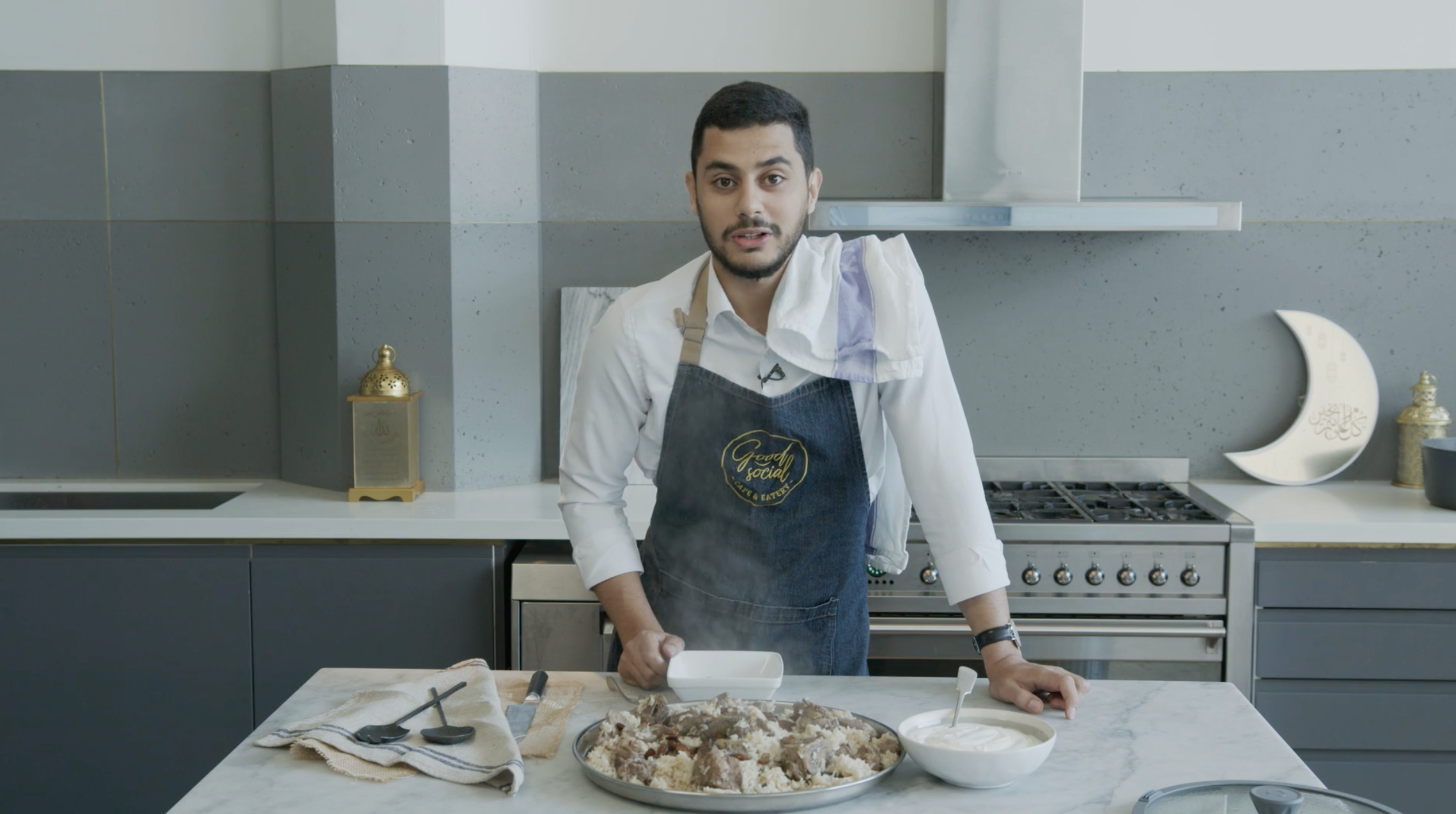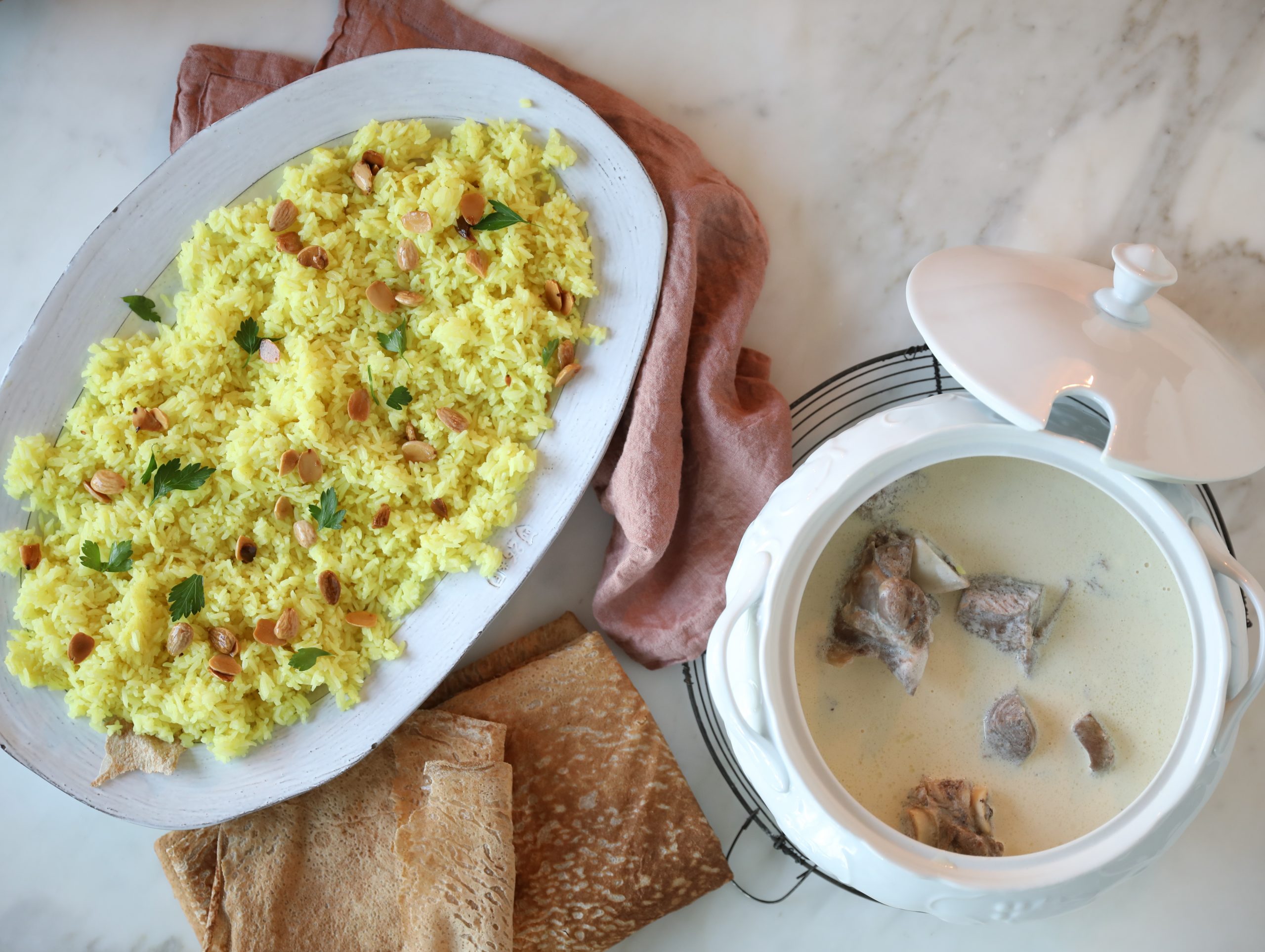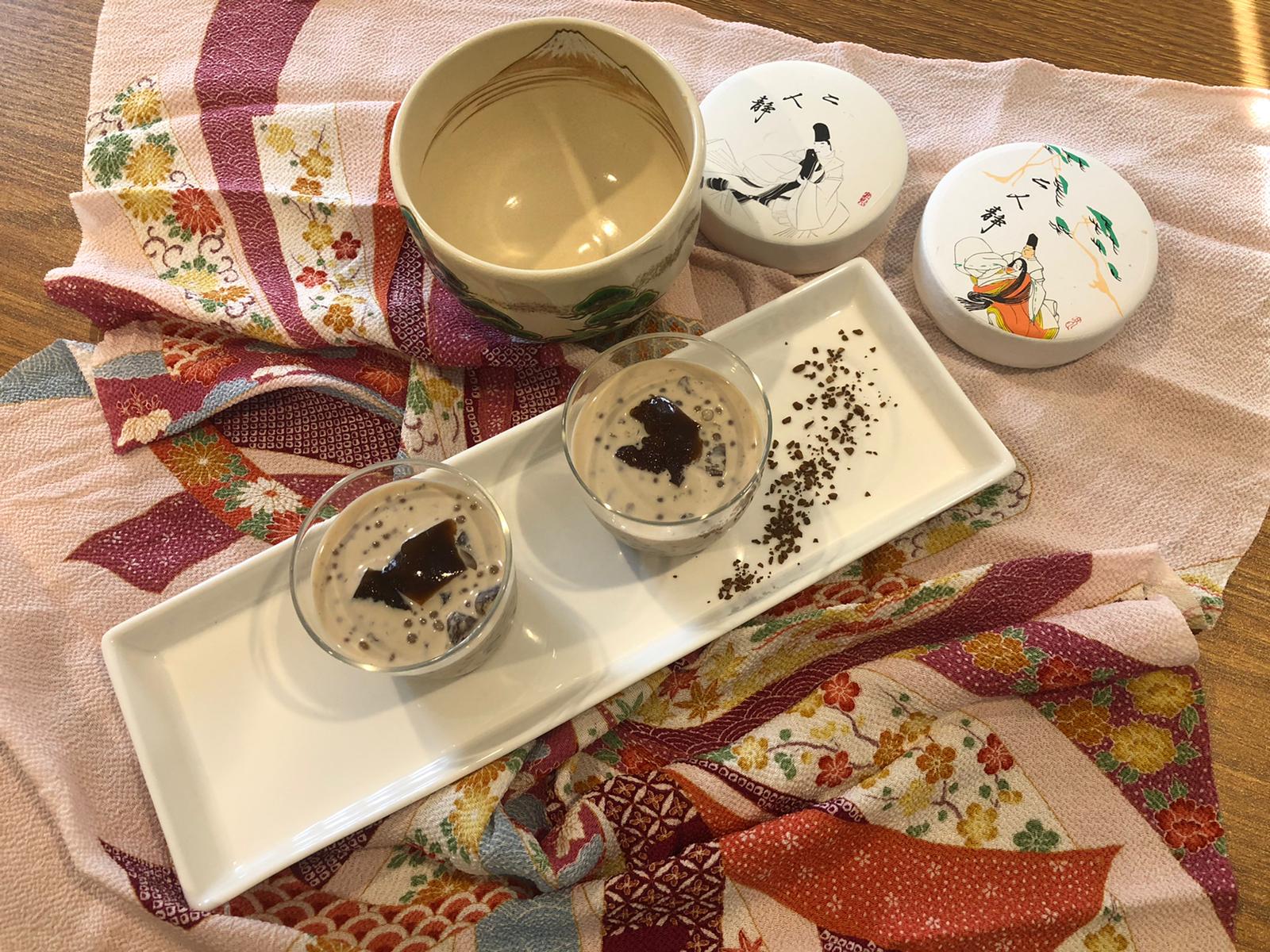Omar’s Lamb and Eggplant Maqluba
 Jordan
Jordan 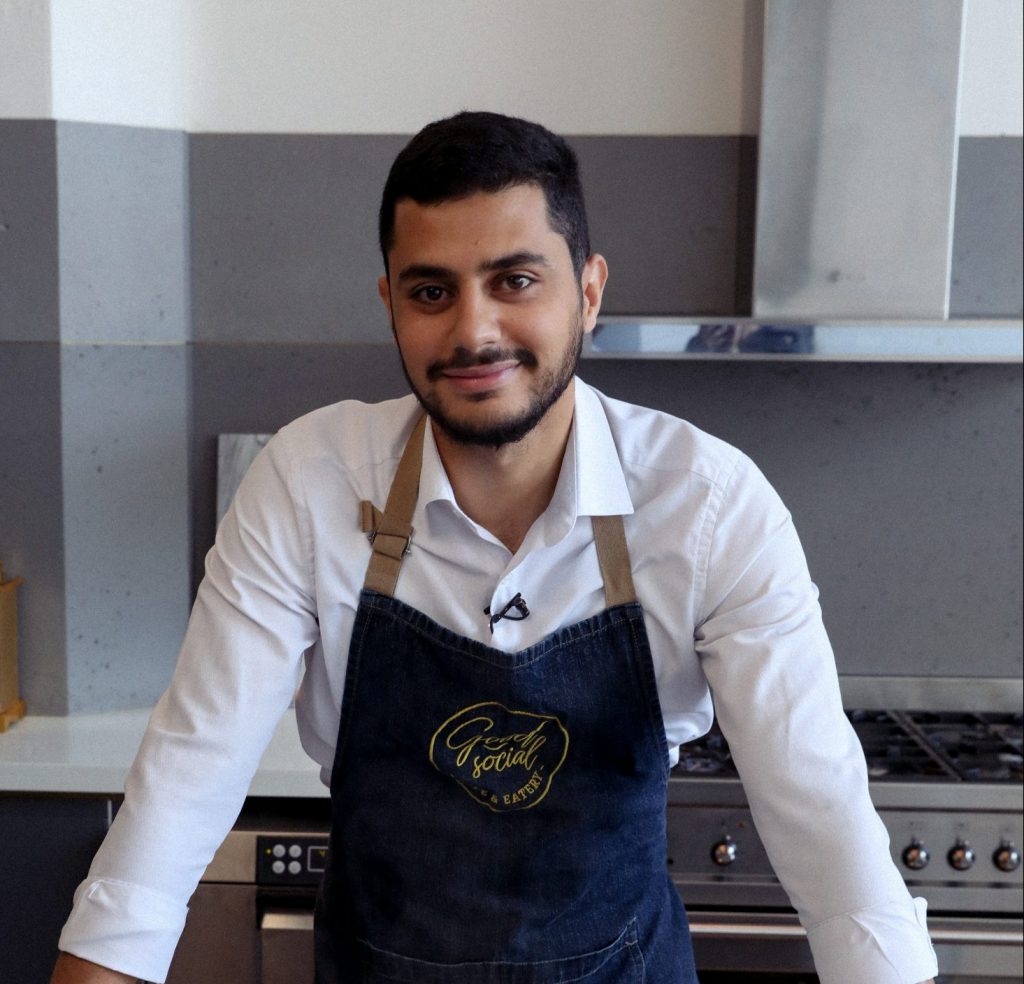
I’ll start with a quote I love about sharing food. In our Islamic faith, feeding people is a form of charity and in a Prophetic narration, the Prophet Muhammad (pbuh) is reported to have said: “The best of you are those who feed others.” [Ahmed]
Both my parents are of Jordanian background and were born and raised there before migrating to Australia in 1990. They are both good cooks and this dish reminds me of them and of my grandmother back in Jordan. It is one of my absolute favourites.
In Arabic, Maqluba literally means ‘upside down’ and it is essentially meat, rice and fried veggies cooked in layers in one pot and flipped upside down onto a big plate or communal platter to serve – the sort of thing Jamie Oliver would probably do at the table for dramatic effect. The rice stays on the bottom, and the meat is left on the top. The rice takes on a lovely flavour from the meat (a bit like chicken rice if you use chicken) and the meat should fall apart tender.
After Mansaf, Maqluba is one of the most popular dishes in Jordan. The recipe goes back centuries and features in the ‘Kitab al-Tabikh’ – a collection of 13th century recipes and household tips from the Arab world, published in Baghdad. It’s popular in Syria, Palestine, Lebanon and Iraq – all neighbours of Jordan – but it’s believed that it was first called ‘upside down’ in Palestine.
The region of Palestine, historically defined as the territory between the Mediterranean Sea and the River Jordan, lies between three continents (Europe, Africa and Asia) and was one of the first places in the world to see human habitation, agriculture and civilisation. It has been a crossroads for religion and culture, trade, politics and food for centuries and with its strategic position, has been controlled by many kingdoms, powers and empires.
Jordan, where my family is from, lies to the east of the River Jordan. My father is from the city of Irbid in the north west of Jordan. His forefathers were one of the seven tribes that settled in the region around the seven water wells that existed back then. 70km from Amman and 20km from the Syrian border, Irbid is now Jordan’s third largest city with a population of nearly 2 million people and four major universities.
My mother on the hand is from a village about an hour’s drive further north, the beautiful village of Um Qais. What’s so beautiful about this village is that almost a millennium and a half ago, it was a Roman city by the name of Gadara and the ruins of the old city still exist. Pre-Covid, tourists from all over the world visited to see its wonders. What makes Um Qais even more extraordinary is that it is right at the Palestine border and its elevated position means you can look out over the River Jordan, the Golan Heights of Syria and the Palestinian city of Tiberias stretching out along the beautiful sea of Galilee.
I have beautiful memories of visiting and sleeping over at my grandparents’ place. I’d wake up early and go for Fajr (Dawn) prayers at the local mosque with my grandfather, then we’d go for a lovely walk in the ruins of the old city and sit on one of the Roman pillars overlooking the breathtaking panorama, just watching the sunrise. If you ever manage to visit in the Spring, from late March to late June, you’ll witness a slice of heaven.
Nearly all our extended family are in Jordan so my parents have tried to take us back a lot so that we’ve grown up knowing our grandparents, aunts and uncles and cousins. It was one holiday to Jordan when I fell in love with this dish, Maqluba.
Just like any other child, I didn’t have the best of relationships with vegetables; in particular eggplants. Maqluba was a dish I always used to turn away from due to the fact that besides the meat and rice, the core ingredient was either eggplants or cauliflower.
That all changed when I visited my father’s parents during one of my school summer holidays. I stepped into my grandmother’s kitchen and saw her magic at work from frying the eggplants to flipping the pot upside down. Once it was all plated and I had a bite, I knew I had a new favourite.
My connection to this dish strengthened when my grandmother told me that Maqluba was also the first dish she taught my father.
My father would later on go to study a Telecommunication Engineering degree in Moscow during the Soviet Union era. He has always been a social person so he would gather all his Arab and North African colleagues in small university dorm room and cook Maqluba for them.
He became so good at it that decades later when he would go on charitable trips in the field, he would gather all the people in a village where they were distributing aid and start cooking Maqluba for them in extra-large cauldrons. He even has the video footage in Indonesia to prove it! When he could not find white rice, he would substitute it with basmati but nonetheless, everyone enjoyed it.
All that said, there is no question that my mother is the cook in our family. Amongst her countless tasty dishes, I consider Maqluba as one of her specials. She has one brother in Australia and my cousins always eagerly anticipate Ramadan, waiting for the Iftar invite over to our place, as the main dish for the night has always been Maqluba and they love it.
No matter how bad a day I may have, if I get home and find that she’s cooked one of my favourite three dishes: Mansaf (Jordanian style), Makhshi Koosah (Stuffed Zucchinis) or Maqluba, she manages to turn my frown upside down.
Maqluba can be made with lamb or chicken and eggplant or cauliflower. My favourite is lamb and eggplant and that’s the recipe I’m sharing. It’s great comfort food and perfect for the winter months ahead.
It’s best served with a Jordanian or Arabic salad which usually includes finely diced up cucumber, tomatoes, and bell peppers, dressed in lemon juice and lots of olive oil – the freshness of the cucumber and tomatoes totally complements the rice and lamb. We also serve it with Greek yoghurt, and I love chopped parsley and onions dressed with chilli oil which gives it a bit of bite.
My mother and grandmother can cook it in their sleep, but every man needs a repertoire of dishes he can rustle up and my dad sets a standard!
I actually cooked Maqluba for the first time to make the demonstration video and my mum was quite proud – if a bit disappointed that I hadn’t peeled the eggplant and browned the almonds too much! It will be interesting to hear what my grandmother and family in Jordan think!
It’s been a tough few weeks and a tough Ramadan for my mum and her parents because they lost one of my uncles in Jordan after a 3-week battle for his life against COVID. I dedicate my first Maqluba to them.
Omar Al-Jamal
May 2021
Share this story
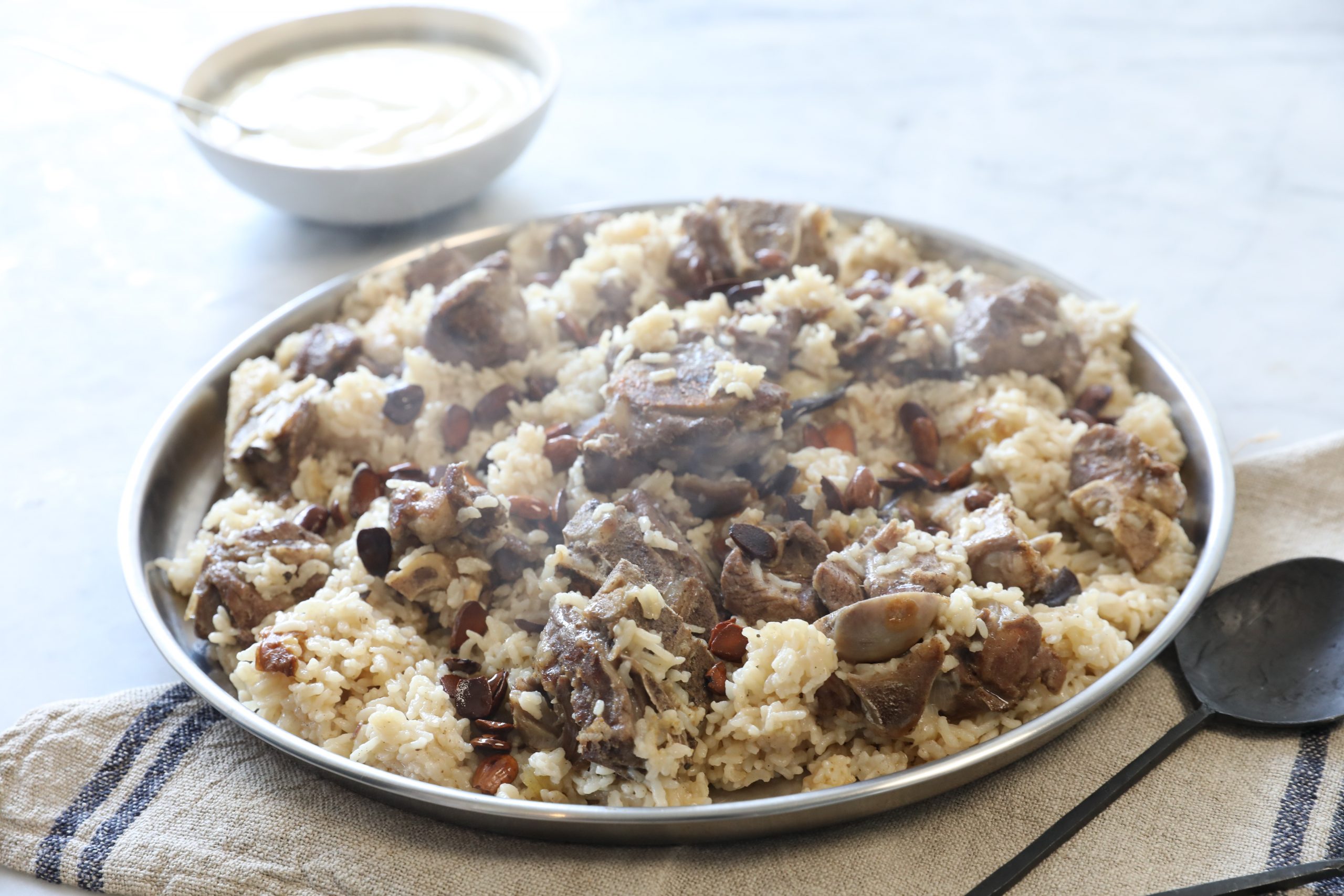
The Meat
- Cut any fat off the lamb and wash the meat pieces thoroughly. Place all meat pieces into the pot
- Boil a full kettle of water and pour over the meat so that the water covers the meat
- Place pot on stove on high heat and close with lid to bring to the boil
- Have a small bowl and a large spoon to hand to remove all the froth that floats to the top.
- Add all 4 quartered onion pieces. Sprinkle with 1 tablespoon of pepper and 1 tablespoon of 7 Spice and add the handful of bay leaves.
- Close lid, place on low heat and simmer on the stove for 1 hour and 30mins minimum.
Prepare the Eggplants while the meat is cooking
- Remove the calyx/sepal (the hard green leaves on top)
- Peel the eggplants (not everyone does this but peeling is traditional)
- Cut eggplants in half horizontally then cut each half into thin slices 1cm wide
- Sprinkle salt onto the slices of eggplant then rub the salt thoroughly onto all slices with your hands
- Leave to rest for 1 hour and 30mins. (The salt will bring out beads of moisture while the eggplants rest)
Prepare the rice while the meat is cooking and eggplants are resting.
- Place 3 cups of rice in a bowl, completely cover the rice with water and leave to rinse for an hour
- After an hour, place the rice in a large sieve and rinse away any dirt
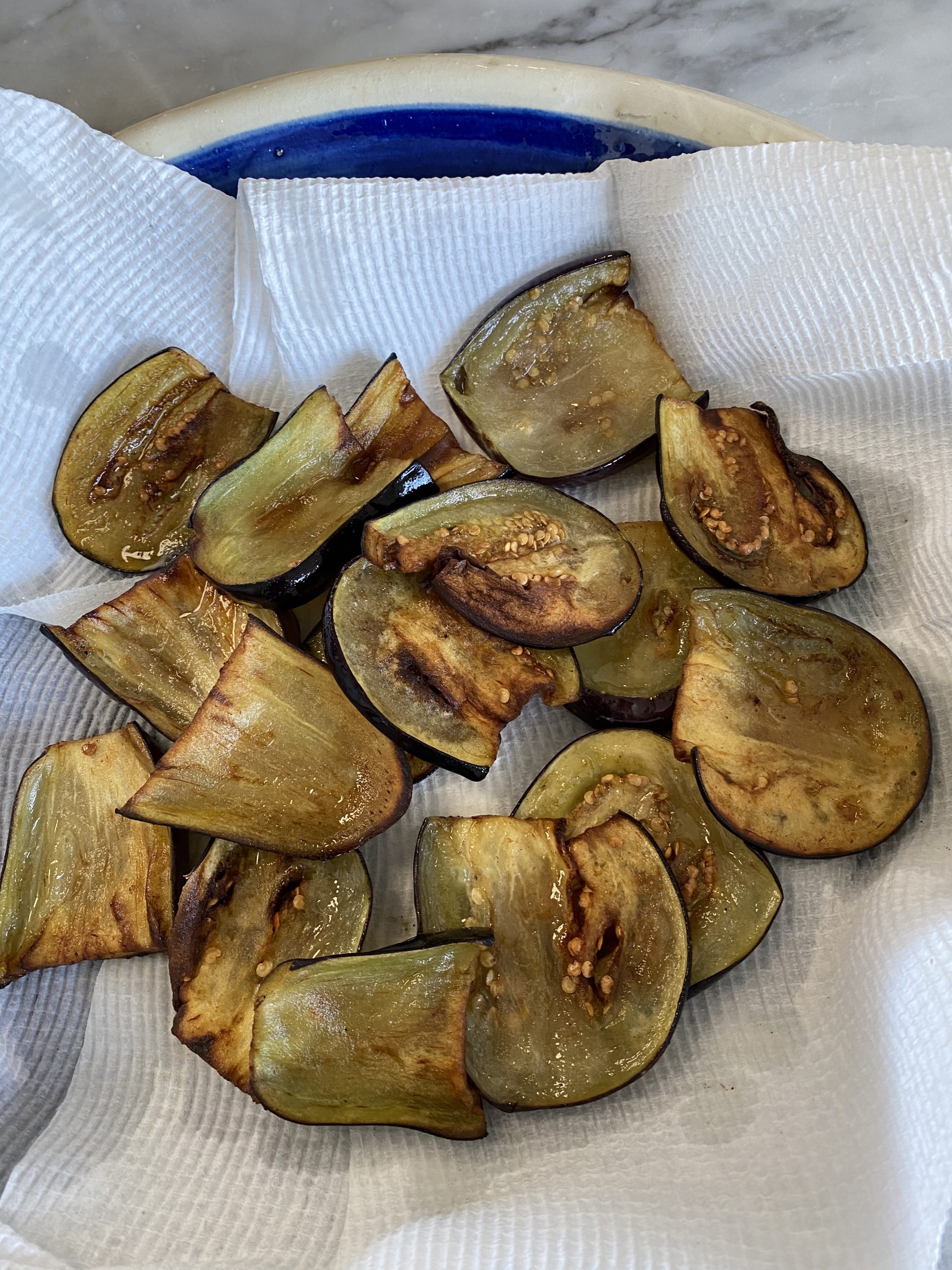
The Eggplant (Phase II)
- Place your salted eggplants under running water to wash off the salt
- Squeeze the water out of the eggplant slices with your hands.
- Fill a quarter of a large frying pan with canola oil and place the frying pan full of oil on high heat
- Once hot, place eggplant slices in the pan to fry. Each side needs 3-4mins. Remove once colour is golden. (Keep an eye on them so they don’t burn)
- Place fried eggplant slices onto a plate with kitchen paper to soak up the oil
Almonds
- Brown the almonds using the same pan of oil you used to fry the eggplants, with the stove on medium heat. Keep stirring until golden then remove and set aside.
The ‘Levelling’
- Remove the pot of meat from the stove and with a large sieve spoon / straining spoon lift the pieces of meat out of the pot and place into a second larger pot, covering the bottom of the pot with a layer of meat. Save the meat broth.
- Place the fried eggplant slices as another layer on top of the meat.
- Sprinkle a pinch of pepper, a pinch of 7 Spice and a full tablespoon of salt.
- Pour in the rice on top of the layer of eggplant. Level nicely.
- Boil a kettle of water and pour 4 cups of boiling water into the pot.
- Then pour 2 cups of the meat broth into pot.
- Cover pot with lid, leaving slightly open for steam to escape and place on high heat for 5 mins.
- After 5 mins check that the water has evaporated and is no longer boiling, then place stove on low heat for another 5mins. (You should no longer see bubbles)
- Turn off the stove and using the handle end of a fork or spoon, poke holes into the rice. If there is any water remaining at the bottom, it will rise & evaporate.
- Close the pot and let it rest for 10 mins
- Remove lid from pot. Cover the pot with your large plate or platter and VERY carefully, flip the pot upside down. This is something you can do at the table for drama – if you are confident!
- Spread the rice evenly. The meat and eggplant will sit on top
- Sprinkle the almonds on top, serve and enjoy.

Variations on a theme:
- Some people line the pot with potato slices before that first layer of meat
- You can also add thinly sliced tomatoes or other vegetables
- fry some pine nuts to add more crunch with the almonds when serving
- Finely chopped parsley and/or slices of lemon sprinkled on top adds colour
- Try chicken instead of lamb and cauliflower instead of eggplant
